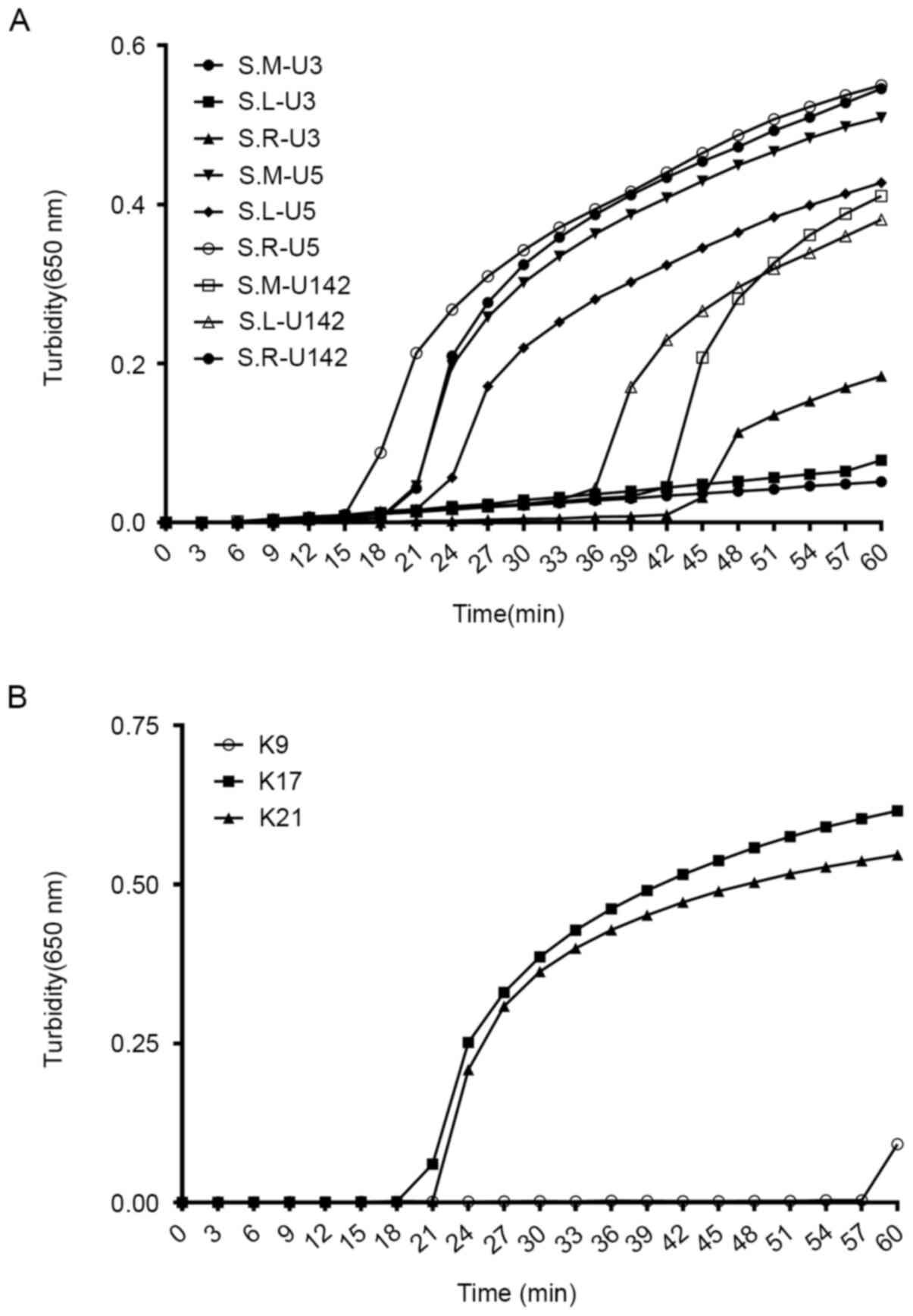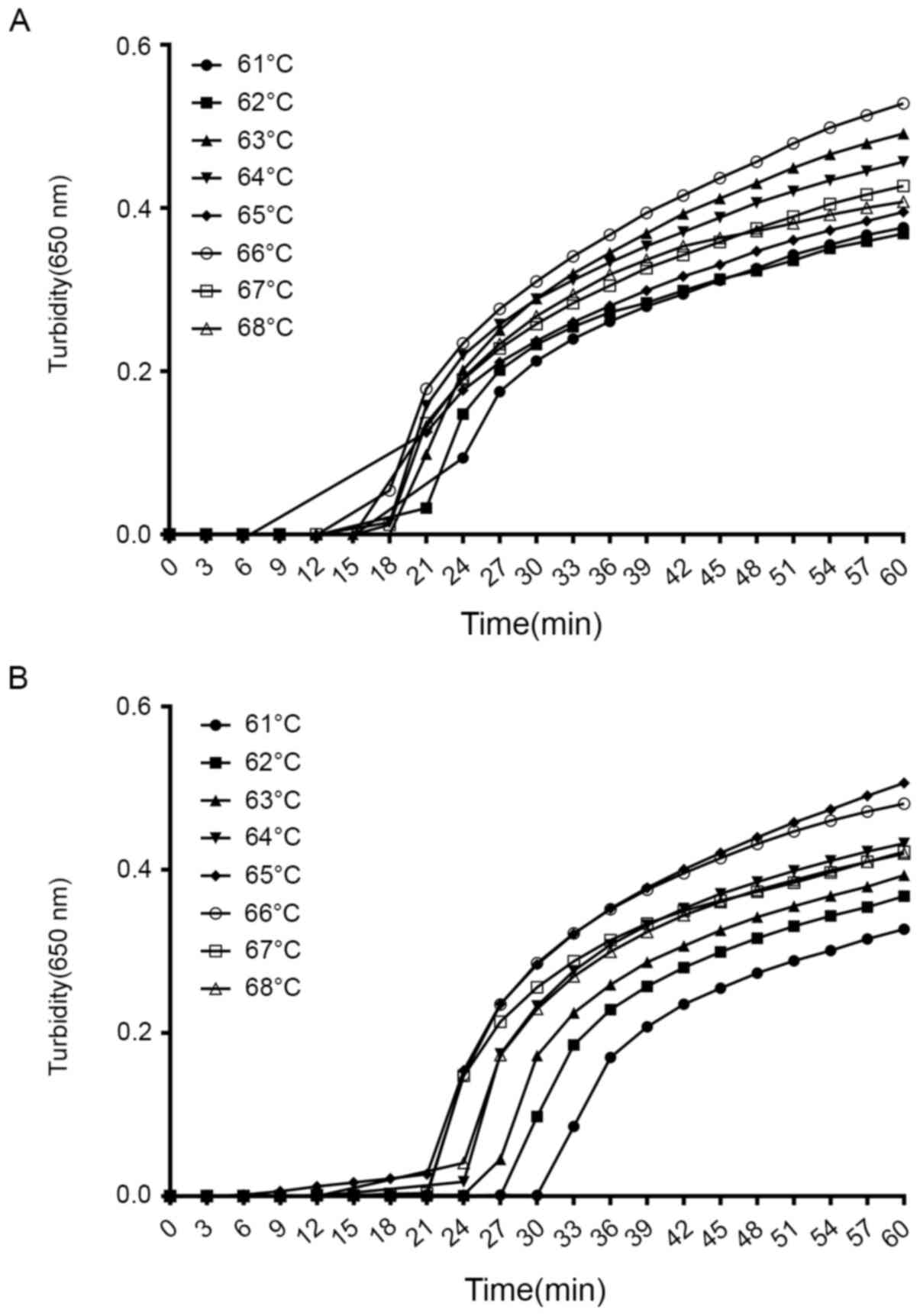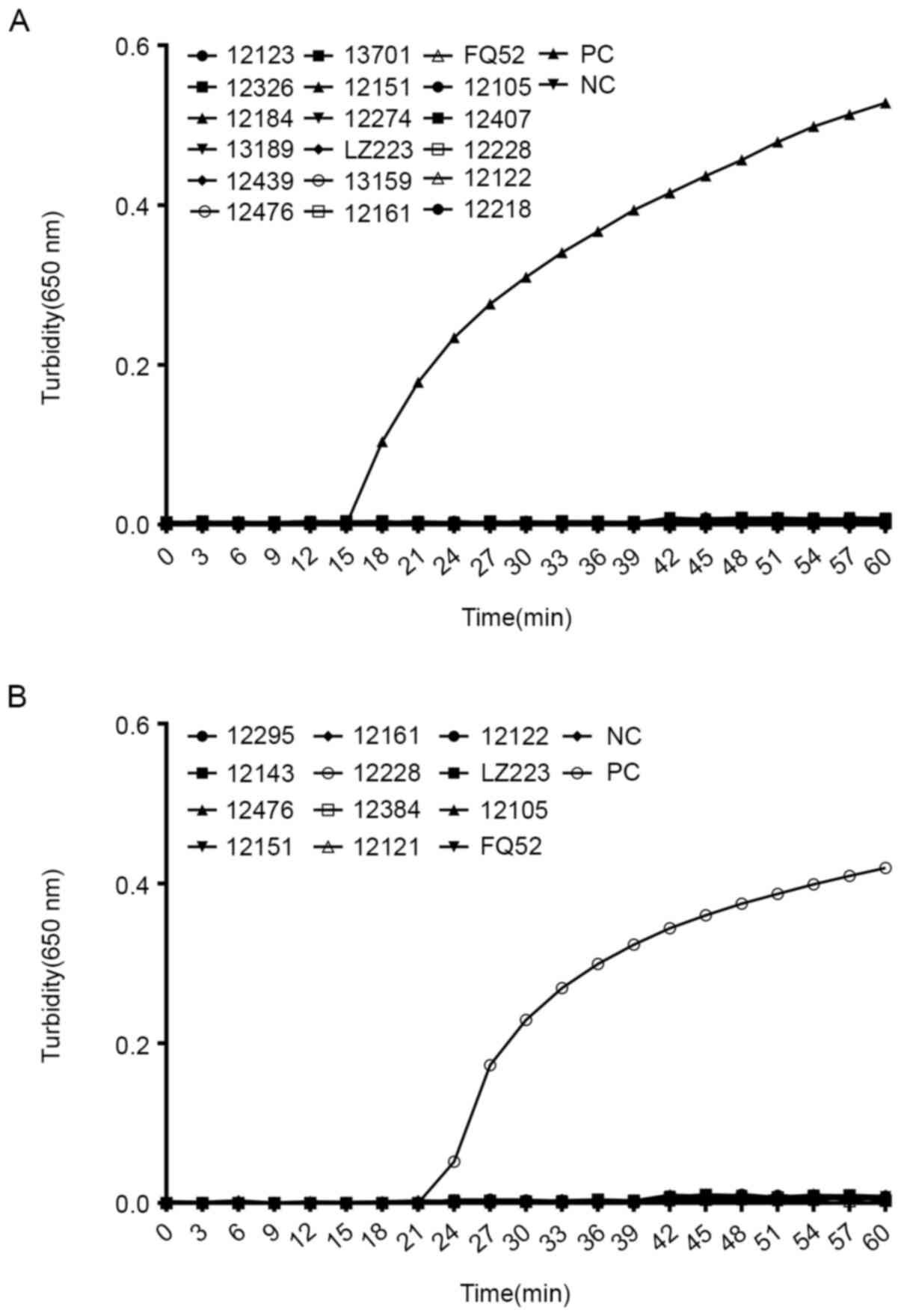|
1
|
Ogtrop ML, van Zoeren-Grobben D,
Verbakel-Salomons EM and van Boven CP: Serratia marcescens
infections in neonatal departments: Description of an outbreak and
review of the literature. J Hosp Infect. 36:95–103. 1997.PubMed/NCBI View Article : Google Scholar
|
|
2
|
Manning ML, Archibald LK, Bell LM,
Banerjee SN and Jarvis WR: Serratia marcescens transmission
in a pediatric intensive care unit: A multifactorial occurrence. Am
J Infect Control. 29:115–119. 2001.PubMed/NCBI View Article : Google Scholar
|
|
3
|
Dessì A, Puddu M, Testa M, Marcialis MA,
Pintus MC and Fanos V: Serratia marcescens infections and
outbreaks in neonatal intensive care units. J Chemother.
21:493–499. 2009.PubMed/NCBI View Article : Google Scholar
|
|
4
|
Hsieh S and Babl FE: Serratia
marcescens cellulitis following an iguana bite. Clin Infet Dis.
28:1181–1182. 1999.PubMed/NCBI View
Article : Google Scholar
|
|
5
|
Chaidaroon W and Supalaset S: Corneal ring
infiltrates caused by Serratia marcescens in a patient with
human immunodeficiency virus. Case Rep Ophthalmol. 7:359–363.
2016.PubMed/NCBI View Article : Google Scholar
|
|
6
|
Gastmeier P: Serratia marcescens:
An outbreak experience. Front Microbiol. 5(81)2014.PubMed/NCBI View Article : Google Scholar
|
|
7
|
Knowles S, Herra C, Devitt E, O'Brien A,
Mulvihill E, McCann SR, Browne P, Kennedy MJ and Keane CT: An
outbreak of multiply resistant Serratia marcescens: The
importance of persistent carriage. Bone Marrow Transplant.
25:873–877. 2000.PubMed/NCBI View Article : Google Scholar
|
|
8
|
Gupta N, Hocevar SN, Moulton-Meissner HA,
Stevens KM, McIntyre MG, Jensen B, Kuhar DT, Noble-Wang JA, Schnatz
RG, Becker SC, et al: Outbreak of Serratia marcescens
bloodstream infections in patients receiving parenteral nutrition
prepared by a compounding pharmacy. Clin Infect Dis. 59:1–8.
2014.PubMed/NCBI View Article : Google Scholar
|
|
9
|
Sullivan KV, Deburger B, Roundtree SS,
Ventrola CA, Blecker-Shelly DL and Mortensen JE: Pediatric
multicenter evaluation of the Verigene gram-negative blood culture
test for rapid detection of inpatient bacteremia involving
gram-negative organisms, extended-spectrum beta-lactamases, and
carbapenemases. J Clin Microbiol. 52:2416–2421. 2014.PubMed/NCBI View Article : Google Scholar
|
|
10
|
Tojo M, Fujita T, Ainoda Y, Nagamatsu M,
Hayakawa K, Mezaki K, Sakurai A, Masui Y, Yazaki H, Takahashi H, et
al: Evaluation of an automated rapid diagnostic assay for detection
of Gram-negative bacteria and their drug-resistance genes in
positive blood cultures. PLoS One. 9(e94064)2014.PubMed/NCBI View Article : Google Scholar
|
|
11
|
Nasri E, Subirats J, Sànchez-Melsió A,
Mansour HB, Borrego CM and Balcázar JL: Abundance of carbapenemase
genes (blaKPC, blaNDM and
blaOXA-48) in wastewater effluents from Tunisian
hospitals. Environ Pollut. 229:371–374. 2017.PubMed/NCBI View Article : Google Scholar
|
|
12
|
Srisrattakarn A, Lulitanond A,
Wilailuckana C, Charoensri N, Wonglakorn L, Saeniamla P, Daduang J
and Chanawong A: Rapid and simple identification of carbapenemase
genes, bla NDM, bla OXA-48, bla VIM, bla
IMP-14 and bla KPC groups, in Gram-negative
bacilli by in-house loop-mediated isothermal amplification with
hydroxynaphthol blue dye. World J Microbiol Biotechnol.
33(130)2017.PubMed/NCBI View Article : Google Scholar
|
|
13
|
Hopkins KL, Findlay J, Meunier D, Cummins
M, Curtis S, Kustos I, Mustafa N, Perry C, Pike R and Woodford N:
Serratia marcescens producing SME carbapenemases: An
emerging resistance problem in the UK? J Antimicrob Chemother.
72:1535–1537. 2017.PubMed/NCBI View Article : Google Scholar
|
|
14
|
Pollett S, Miller S, Hindler J, Uslan D,
Carvalho M and Humphries RM: Phenotypic and molecular
characteristics of carbapenem-resistant Enterobacteriaceae
in a health care system in Los Angeles, California, from 2011 to
2013. J Clin Microbiol. 52:4003–4009. 2014.PubMed/NCBI View Article : Google Scholar
|
|
15
|
Wachino J, Yoshida H, Yamane K, Suzuki S,
Matsui M, Yamaqishi T, Tsutsui A, Konda T, Shibayama K and Arakawa
Y: SMB-1, a novel subclass B3 metallo-beta-lactamase, associated
with ISCR1 and a class 1 integron, from a carbapenem-resistant
Serratia marcescens clinical isolate. Antimicrob Agents
Chemother. 55:5143–5149. 2011.PubMed/NCBI View Article : Google Scholar
|
|
16
|
de Vries JJ, Baas WH, van der Ploeg K,
Heesink A, Degener JE and Arends JP: Outbreak of Serratia
marcescens colonization and infection traced to a healthcare
worker with long-term carriage on the hands. Infect Control Hosp
Epidemiol. 27:1153–1158. 2006.PubMed/NCBI View
Article : Google Scholar
|
|
17
|
Nodari CS, Siebert M, Matte UDS and Barth
AL: Draft genome sequence of a GES-5-producing Serratia
marcescens isolated in southern Brazil. Braz J Microbiol.
48:191–192. 2017.PubMed/NCBI View Article : Google Scholar
|
|
18
|
Wendel AF, Kaase M, Autenrieth IB, Peter
S, Oberhettinger P, Rieber H, Pfeffer K, Mackenzie CR and Willmann
M: Protracted regional dissemination of GIM-1-producing Serratia
marcescens in western germany. Antimicrob Agents Chemother.
61:e01880–16. 2017.PubMed/NCBI View Article : Google Scholar
|
|
19
|
Mahlen SD: Serratia infections: From
military experiments to current practice. Clin Microbiol Rev.
24:755–791. 2011.PubMed/NCBI View Article : Google Scholar
|
|
20
|
Wong YP, Othman S, Lau YL, Son R and Chee
HY: Loop mediated isothermal amplification (LAMP): A versatile
technique for detection of microorganisms. J Appl Microbiol.
124:626–643. 2017.PubMed/NCBI View Article : Google Scholar
|
|
21
|
Sakai J, Maeda T, Tarumoto N, Misawa K,
Tamura S, Imai K, Yamaguchi T, Iwata S, Murakami T and Maesaki S: A
novel detection procedure for mutations in the 23S rRNA gene of
Mycoplasma pneumoniae with peptide nucleic acid-mediated
loop-mediated isothermal amplification assay. J Microbiol Methods.
141:90–96. 2017.PubMed/NCBI View Article : Google Scholar
|
|
22
|
Mashooq M, Kumar D, Niranjan AK, Agarwal
RK and Rathore R: Development and evaluation of probe based real
time loop mediated isothermal amplification for Salmonella: A new
tool for DNA quantification. J Microbiol Methods. 126:24–29.
2016.PubMed/NCBI View Article : Google Scholar
|
|
23
|
Lin M, Liu W, Wang P, Tan J, Zhou Y, Wu P,
Zhang T, Yuan J and Chen Y: Rapid detection of ermB gene in
Clostridium difficile by loop-mediated isothermal
amplification. J Med Microbiol. 64:854–861. 2015.PubMed/NCBI View Article : Google Scholar
|
|
24
|
Cai JC, Zhou HW, Zhang R and Chen GX:
Emergence of Serratia marcescens, Klebsiella
pneumoniae, and Escherichia coli Isolates possessing the
plasmid-mediated carbapenem-hydrolyzing beta-lactamase KPC-2 in
intensive care units of a Chinese hospital. Antimicrob Agents
Chemother. 52:2014–2018. 2008.PubMed/NCBI View Article : Google Scholar
|
|
25
|
Lin X, Hu Q, Zhang R, Hu Y, Xu X and Lv H:
Emergence of Serratia marcescens isolates possessing
Carbapenem-hydrolysing β-lactamase KPC-2 from China. J Hosp Infect.
94:65–67. 2016.PubMed/NCBI View Article : Google Scholar
|
|
26
|
Zhou T, Zhang X, Guo M, Ye J, Lu Y, Bao Q
and Chi W: Phenotypic and molecular characteristics of
carbapenem-non-susceptible Enterobacteriaceae from a teaching
hospital in Wenzhou, southern China. Jpn J Infect Dis. 66:96–102.
2013.PubMed/NCBI View Article : Google Scholar
|
|
27
|
Zhang R, Liu L, Zhou H, Chan EW, Li J,
Fang Y, Li Y, Liao K and Chen S: Nationwide surveillance of
clinical carbapenem-resistant Enterobacteriaceae (CRE) strains in
China. EBioMedicine. 19:98–106. 2017.PubMed/NCBI View Article : Google Scholar
|
|
28
|
Li B, Feng J, Zhan Z, Yin Z, Jiang Q, Wei
P, Chen X, Gao B, Hou J, Mao P, et al: Dissemination of
KPC-2-encoding IncX6 plasmids among multiple
Enterobacteriaceae Species in a Single Chinese Hospital.
Front. Microbiol. 9(478)2018.PubMed/NCBI View Article : Google Scholar
|
|
29
|
Thompson JD, Higgins DG and Gibson TJ:
CLUSTAL W: Improving the sensitivity of progressive multiple
sequence alignment through sequence weighting, position-specific
gap penalties and weight matrix choice. Nucleic Acids Res.
22:4673–4680. 1994.PubMed/NCBI View Article : Google Scholar
|
|
30
|
Garrity G, Staley JT, Boone DR, De Vos P,
Goodfellow M and Rainey FA: Bergey's manual® of
systematic bacteriology. In: Vol 2 The Proteobacteria, Part B: The
Gammaproteobacteria. Springer, New York, NY, 2006.
|
|
31
|
Joyner J, Wanless D, Sinigalliano CD and
Lipp EK: Use of quantitative real-time PCR for direct detection of
Serratia marcescens in marine and other aquatic
environments. Appl Environ Microbiol. 80:1679–1683. 2014.PubMed/NCBI View Article : Google Scholar
|
|
32
|
Ferrer R, Martin-Loeches I, Phillips G,
Osborn TM, Townsend S, Dellinger RP, Artiqas A, Schorr C and Levy
MM: Empiric antibiotic treatment reduces mortality in severe sepsis
and septic shock from the first hour: Results from a
guideline-based performance improvement program. Crit Care Med.
42:1749–1755. 2014.PubMed/NCBI View Article : Google Scholar
|
|
33
|
Khanna A, Khanna M and Aggarwal A:
Serratia marcescens-a rare opportunistic nosocomial pathogen
and measures to limit its spread in hospitalized patients. J Clin
Diagn Res. 7:243–246. 2013.PubMed/NCBI View Article : Google Scholar
|
|
34
|
Farhoudi HO, Banks T and Ali N: A case
report of serratia endocarditis with review of the literature. Med
Ann Dist Columbia. 43:401–406. 1974.PubMed/NCBI
|
|
35
|
Su JR, Blossom DB, Chung W, Gullion JS,
Pascoe N, Heseltine G and Srinivasan A: Epidemiologic investigation
of a 2007 outbreak of Serratia marcescens bloodstream
infection in Texas caused by contamination of syringes prefilled
with heparin and saline. Infect Control Hosp Epidemiol. 30:593–595.
2009.PubMed/NCBI View
Article : Google Scholar
|
|
36
|
Chemaly RF, Rathod DB, Sikka MK, Hayden
MK, Hutchins M, Horn T, Tarrand J, Adachi J, Nguyen K, Trenholme G
and Raad I: Serratia marcescens bacteremia because of
contaminated prefilled heparin and saline syringes: a multi-state
report. Am J Infect Control. 39:521–524. 2011.PubMed/NCBI View Article : Google Scholar
|
|
37
|
Enosawa M, Kageyama S, Sawai K, Watanabe
K, Notomi T, Onoe S, Mori Y and Yokomizo Y: Use of loop-mediated
isothermal amplification of the IS900 sequence for rapid detection
of cultured Mycobacterium avium subsp. paratuberculosis. J Clin
Microbiol. 41:4359–4365. 2003.PubMed/NCBI View Article : Google Scholar
|
|
38
|
Dhama K, Karthik K, Chakraborty S, Tiwari
R, Kapoor S, Kuamr A and Thomas P: Loop-mediated isothermal
amplification of DNA (LAMP): A new diagnostic tool lights the world
of diagnosis of animal and human pathogens: A review. Pak J Biol
Sci. 17:151–166. 2014.PubMed/NCBI View Article : Google Scholar
|
|
39
|
Notomi T, Mori Y, Tomtia N and Kanda H:
Loop-mediated isothermal amplification (LAMP): Principle, features,
and future prospects. J Microbiol. 53:1–5. 2015.PubMed/NCBI View Article : Google Scholar
|
|
40
|
Lin WH, Zou BJ, Song QX and Zhou GH:
Progress in multiplex loop-mediated isothermal amplification
technology. Yi Chuan. 37:899–910. 2015.PubMed/NCBI View Article : Google Scholar
|



















